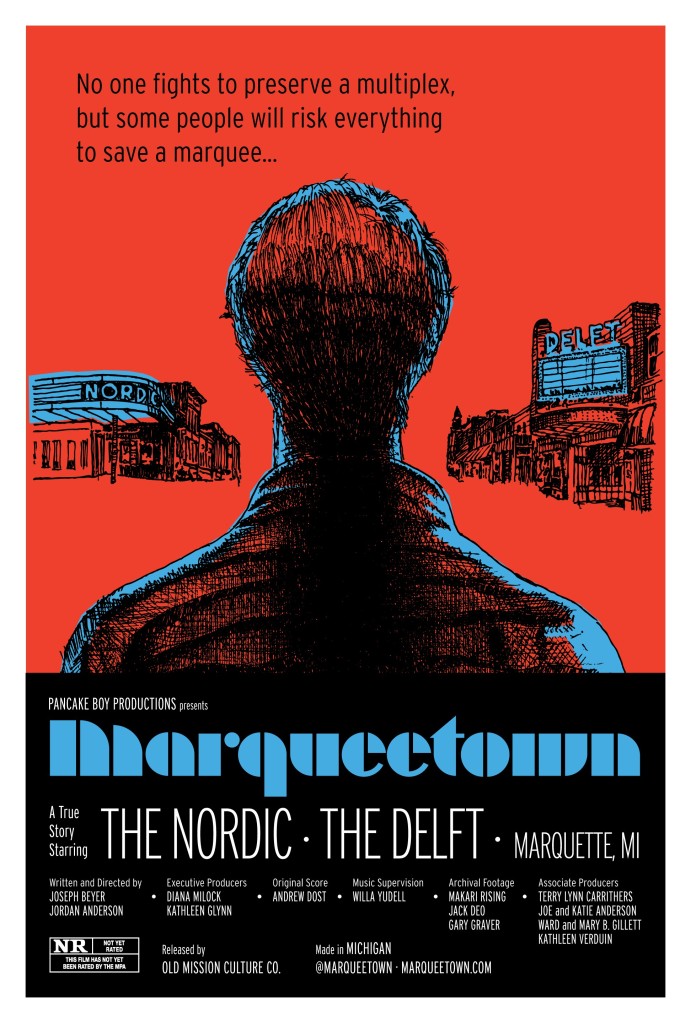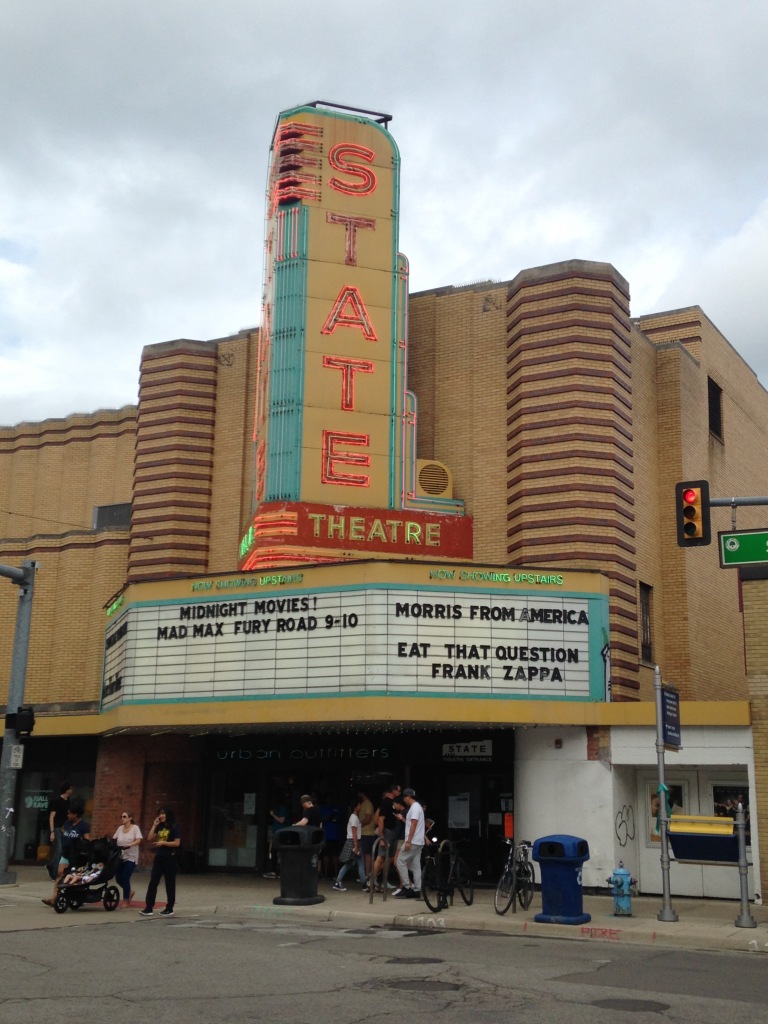
A few years ago I ate dinner at The Delft Bistro in Marquette, the largest city on Michigan’s Upper Peninsula. I could guess from the large marquee outside and the film-themed decor inside that the building had once been a movie theater, and that the restaurant’s owners had decided to pay homage to that history when developing their business. But as I ate my (very excellent) dinner, I didn’t give much thought to the previous life of the Delft, or of movie theaters in Marquette.
Last night’s screening of Marqueetown at the Penn Theatre entirely changed my view on that dining experience. The documentary relates the history of the Delft and the Nordic, movie theaters that once faced each other on West Washington Street, the city’s main drag. During Marquette’s heyday as a major mining town in the U.P. before and just following World War II, there was more than enough business to sustain both theaters. As the city declined in the 1960s and ’70s, however, and after a 10-screen multiplex “tin box” opened not far away, the smaller historic venues couldn’t compete. First the Nordic and then the Delft closed their doors.
Marqueetown follows Marquette native Bernie Rosendahl as he endeavors to reopen the Nordic (an effort that he admits flirts with obsessive) and talks about the importance of such small historic theaters in their communities. Interviews with Rosendahl and others with ties to the theater business in the U.P are interspersed with Drunk History-style “historic” footage, each filmed as a movie genre appropriate to the era it discusses.

Rescuing historic movie venues—like the Penn, and Ann Arbor’s Michigan and State Theaters—is a challenging venture, and one might wonder, “Why bother?” Marqueetown makes a forceful argument for preserving not only historic buildings, but the community and the memories that surround them. As my dinner at The Delft Bistro implies, “saving” these historic theaters doesn’t necessarily mean returning them to their original purpose. Instead, they can be revamped and reborn, providing new generations with not only new memories but also an appreciation for the past.
Marqueetown is currently on tour in Michigan and will be shown on PBS channels here in the fall.
New Goodreads Reviews


Recommendations
China Stories
Keith Bradsher, “China Is Testing More Driverless Cars Than Any Other Country”
Charlie Campbell, “Taiwan’s New President Lai Ching-te Is Standing His Ground”
Beijing has made clear it intends to be the global leader in implementing AI into its massive education system. For top education officials, AI is seen as a shortcut to advancing sorely-needed educational reforms; the hope is that the technology can address China’s infamously inflexible and regimented education system by providing personalized guidance while also narrowing the gap between China’s most privileged and disadvantaged students.
Matthew J. Dagher-Margosian and Eliot Chen, “Teacher’s Pet”
Helen Davidson, “China #MeToo journalist sentenced to five years in jail, supporters say”
Helen Davidson and Lin Chi-hui, “Empty classrooms, silent halls: Taiwan’s declining birthrate forces schools to close”
Charles Hutzler, “The Committee that Ended the Age of Engagement?”
Chris Lau, “Vigilante Hong Kong cabbies went undercover to ensnare illegal Uber drivers. It backfired”
Jeffrey Wasserstrom, “Sarah Conger: Letters from the Boxer Rebellion”
Tessa Wong, “A cartoon cat has been vexing China’s censors – now he says they are on his tail”
Han Zhang, “How Members of the Chinese Diaspora Found Their Voices”
Wanderings Around the World
Daniel Immerwahr, “When the C.I.A. Messes Up”
Micaela Kimball, “In Havana, Engineers Are Teaching Tourists Salsa”
Aamna Mohdin, “‘Why are you going back, after all we did to get out?’: returning to the Kenyan refugee camp that shaped my childhood”
Ann M. Simmons, “WSJ Reporter Evan Gershkovich, Falsely Accused of Espionage, Is Indicted in Russia”
Today, nearly three-quarters of everything Americans consume is processed, packaged, shipped, and stored under refrigeration. … the so-called cold chain—the shipping containers, trucks, warehouses, ripening rooms, tank farms, walk-ins, and fridges through which food moves from farm to table—has transformed what we eat, where it’s grown, the layout of our cities and homes, and the very definition of freshness. But perhaps its most remarkable imprint can still be found in how our food actually tastes, for better and for worse.
Nicola Twilley, “How the Fridge Changed Flavor”
Rohan Venkat, “Election links: BJP’s miscalculations, coalition questions and ‘knives out’ in UP”
Standout Story
The files have never seemed more relevant. One in five Germans now supports the far-right party Alternative für Deutschland, and authoritarian parties have been on the rise across Europe. Yet the archive has always faced opposition from two sides: politicians threatened by what its files might contain, and former East Germans who say that the files offer only a narrow, twisted view of their history—one that the West has been all too eager to promote. The Stasi files are like an endless police blotter: a meticulous, bewilderingly detailed account of an entire society’s deceptions and betrayals.
Burkhard Bilger, “Piecing Together the Secrets of the Stasi”
Featured photo: Racers cross the Ambassador Bridge between Detroit, Michigan and Windsor, Ontario during the Detroit Marathon, October 16, 2022. I’m preparing to cross the bridge again—in a car this time—later today, as my brother and I set off on a road trip to Niagara Falls.

Leave a comment